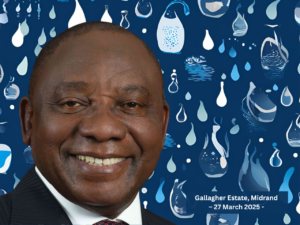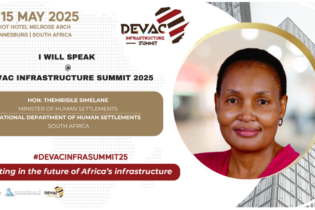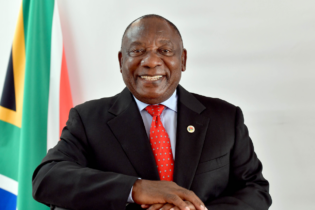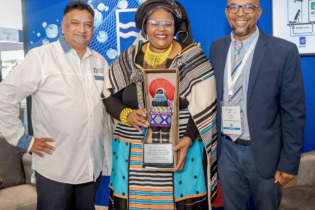President Cyril Ramaphosa Outlines Strategic Vision for South Africa’s Water Security at National Water and Sanitation Indaba.
President Cyril Ramaphosa delivered a keynote address at the National Water and Sanitation Indaba, emphasising the urgent need for a strategic, outcomes-based approach to ensuring water security and sanitation services for all South Africans.
The Indaba, attended by key stakeholders including Minister of Water and Sanitation Ms. Pemmy Majodina, Minister of Cooperative Governance and Traditional Affairs Mr. Velenkosini Hlabisa, and Premier of Gauteng Mr. Panyaza Lesufi, served as a platform to assess progress and address critical challenges in water management.
Water Access: Progress and Challenges
President Ramaphosa highlighted the significant advancements made since the enactment of the National Water Act in 1998. Census 2022 statistics show that access to clean water has risen to 88.5%, while access to improved sanitation now stands at 80.7% – a stark contrast to the pre-1994 era, where nearly 30% of the population lacked water access and over 50% lacked proper sanitation.
Despite these gains, the President acknowledged that much remains to be done.
“We are still far from achieving universal clean water and sanitation, as envisioned in Sustainable Development Goal 6,” he stated.
Key challenges include aging infrastructure, illegal connections, organized crime within the water sector, and financial mismanagement at the municipal level.
Infrastructure Investment and Reform Initiatives
To address infrastructure backlogs, the government has secured R23 billion through the National Infrastructure Fund for seven major water projects, including Phase 2 of the Lesotho Highlands Water Project and the construction of the uMkhomazi and Ntabelanga Dams. Additionally, Operation Vulindlela has prioritized regulatory reforms to enhance water quality, attract investment, and accelerate the processing of water-use licenses – 75% of which are now approved within 90 days.
Structural reforms in the water sector are also underway. The Water Services Amendment Bill will introduce licensing for water service providers to ensure compliance with quality standards, while the forthcoming National Water Resource Infrastructure Agency will enhance oversight and accountability.
Call for Action: Collaboration for Sustainable Water Management
President Ramaphosa urged all stakeholders, including national and provincial governments, local municipalities, and private sector partners, to collaborate in addressing service delivery shortcomings. He emphasized that municipalities must optimize available funding, such as the Urban Settlements Development Grant and the Municipal Infrastructure Grant, to improve water services.
“This Indaba must not be another exercise in diagnosing problems – we know the challenges. What is needed is a clear, actionable turnaround plan to expand water access, enhance infrastructure, and restore governance in water management,” he asserted.
A Secure Water Future for South Africa
Looking ahead, the President reaffirmed the government’s commitment to ensuring long-term water security. He warned that without a radical shift in water resource management, water scarcity could lead to severe economic and social consequences.“The people of South Africa look to this Indaba with hope – for a strategy that upholds their dignity and ensures their right to water and sanitation.”As the National Water and Sanitation Indaba concludes, the focus remains on implementing solutions that will drive meaningful progress in securing South Africa’s water future.
President Ramaphosa’s Address
Good Morning. It is my pleasure to address this Indaba, whose purpose is to develop a clear path to progressively realise the right of our citizens to adequate water and sanitation. March is Human Rights Month, and a time when we celebrate the progress we have made in giving effect to the Bill of Rights in the Constitution. These rights, including the right of access to sufficient food and water, are interrelated and interdependent. At their center is the most fundamental right of all, the right to human dignity. Beyond being a strategic national asset and a key enabler of economic growth, the provision of water is about restoring and affirming the dignity of all. Water and sanitation are key to development. As such, water stewardship, namely its management and equitable distribution, is a national priority. As a country we can be proud of the progress we have made in fulfilling this basic right of our people since the advent of democracy. The National Water Act of 1998 was the key legislative enabler to facilitate access to adequate water and sanitation for our people. The results of Census 2022 point to our ongoing progress since the National Water Act was signed into law. In 2022 access to clean water stood at 88,5 per cent, and access to improved sanitation stood at 80,7 per cent. One contrasts this to the apartheid legacy where by 1994, approximately 30 per cent of the population lacked access to adequate water supply, and more than 50 per cent were without adequate sanitation. The Department of Water and Sanitation is to be commended for its ongoing efforts to improve water and sanitation access in our country. This includes progress towards meeting the minimum standards for the provision of water and sanitation services, and in addressing connection backlogs. Water Infrastructure build is on the up. The National Infrastructure Fund has to date secured R23 billion for seven large water infrastructure projects, Phase 2 of the Lesotho Highlands Water Project has resumed, as has work on the uMkhomazi Dam; and preparations are underway for the construction of the Ntabelanga Dam on the uMzimvubu River. We have a number of other water infrastructure projects earmarked for blended financing through the Infrastructure Fund, such as the Polihali Dam that will feed 490 million cubic meters of water a year from the Lesotho Highlands into the Vaal River System. Whilst these long-term water infrastructure build projects will undoubtedly mitigate current supply challenges being experienced, we are keenly aware that security of supply is by no means our only challenge. We are still very much a long way off from achieving clean water and sanitation for all, as encapsulated in Sustainable Development Goal 6. Last year’s Water Summit identified ageing and poorly-maintained infrastructure, vandalism of water infrastructure, illegal connections, and organised crime in the water sector as some of the challenges facing service delivery in this sector. At a local government level, financial mismanagement, insufficient revenue collection systems and high levels of physical water losses are compounding existing service delivery problems. These challenges have been consistently reflected in reports of the Municipal Strategic Self-Assessment, Stats SA, the Auditor-General and others. With this dire state of affairs we have seen declining private sector investment in water infrastructure, a situation that is only now improving. By equal measure, municipalities have not reinvested the revenue they earn from the provision of services to the upkeep of key water infrastructure. Governance challenges and inefficiencies at the various reporting entities including the Water Boards have long been in the public domain. A number of water boards have been or are the subject of probes by the Special Investigating Unit or SIU for corruption and fraud. These are problems impacting a country with a growing population, that is one of the most water-scarce countries in the world.This Water Indaba must be located within broader global context.
The World Resources Institute estimates that the biggest change in water demand between now and 2050 will occur in sub-Saharan Africa. it ranks South Africa amongst 25 countries that are extremely water stressed: and that are currently using over 80 per cent of their water supply to meet domestic need. At a global level, the climate crisis will further exacerbate not just South Africa’s but the world’s water security. These factors make for what is called a perfect storm – where dry taps, broken infrastructure, and poor management of water resources at local government level is fuelling growing public discontent. Grievances with water and sanitation delivery are behind a number of social protests across the country. Ladies and Gentlemen, In my State of the Nation address earlier this year I defined a secure and reliable water supply across the country as an urgent strategic priority, and it is our expectation that this Water Indaba will be focused, precise and outcomes-based, and not merely deliberative. What is needed as an urgent and high-level national turnaround plan on water security that is firstly aligned to the Government of National Unity’s Medium-Term Development Plan 2025 to 2029, and secondly, that harnesses the momentum of the reforms in the sector. Operation Vulindela has prioritised reforms in the water sector to improve water quality, to catalyse investment in the construction and maintenance of water infrastructure, and strengthen regulation in the sector. Under the sixth administration we reinstated the Drop water quality monitoring system as an important incentive. These reports are particularly important in area where water resources are key to the tourism, agriculture and other sectors. As part of the structural reform process in the water sector, we have been able to significantly reduce the turnaround time for the issuing of water use licenses. Currently, 75 per cent of applications are processed within 90 days. An additional 110 technical and scientific staff have been hired to support further process improvements. Last year we published the Raw Water Pricing Strategy as part of promoting efficient water management, and following a process initiated in 2022 under Operation Vulindlela. This will be key to promoting transparency around how raw water is priced in the country, and will contribute towards instilling business and investor confidence. Creating an enabling legal and regulatory framework for water stewardship is a priority. Through the Water Services Amendment Bill we will introduce a licensing system for water service providers, and remove licenses where providers do not meet the standards for quality drinking water. By next year we hope to finalise the establishment of the National Water Resource Infrastructure Agency, one of the most significant reforms coming to the sector to date. This new agency will bring strategic alignment, consistency and accountability to the various institutional arrangements for water stewardship that have to date proven to be less than ideal. As we do all of these, we have implemented a number of strategic interventions to enhance the delivery of water services in municipalities and support them to address their water and sanitation challenges. One such intervention where we are seeing sustained progress is with the Presidential eThekwini Working Group in KwaZulu-Natal. The ongoing oversight work of the Presidential Water Task Team will augment these efforts, and I am pleased that some of its members are here today. Ladies and Gentlemen, Resolving our country’s water and sanitation challenges necessities deepened collaboration between all stakeholders in the water resources management ecosystem. There needs to be greater cooperation between national and provincial government, the water resource management entities, and the private sector to support the turnaround in water stewardship. Much of this focus must be on supporting service delivery at local government level, where it matters most. Structural reforms in the water sector, as vital as they are, cannot be effectively implemented without local government being strengthened. My call therefore to national government and the department is to use this Indaba as an opportunity to chart a practical course for supporting municipalities in the delivery of water and sanitation. For example, municipalities are not effectively leveraging the likes of the Urban Settlements Development Grant, Municipal Infrastructure Grant and other ring-fenced financial resources to improve the provision of these services in their localities. For its part, local government leadership needs to prioritise turnaround strategies for their respective Water Services Authorities. It will be crucial that the recommendations of the 2024 Water Summit, as well as of various reports including Drop reports, are actually implemented as part of their corrective plans. This Indaba must not become an exercise of problem-diagnosing: the challenges are well-known. What is needed is course correction – and comprehensive plan that will expand access to water and sanitation services, improve the quality of water and sanitation infrastructure, and bring stability and good governance to all the entities involved in South Africa’s water stewardship. It has been said many a time that as humans we can survive for a time without food, but without water we will perish. Others have argued that unless we radically change our approach to managing this precious resource, the wars of the next century will be fought over water. The people of South Africa look to this Water and Sanitation Indaba with hope, and for a clear strategy and plan on how to uphold their dignity through the provision of water and sanitation services that are their basic right. We also look to this Indaba for a clear vision for ensuring South Africa’s water security well into the future. I wish you well in your deliberations and I look forward to the outcomes. I thank you.






